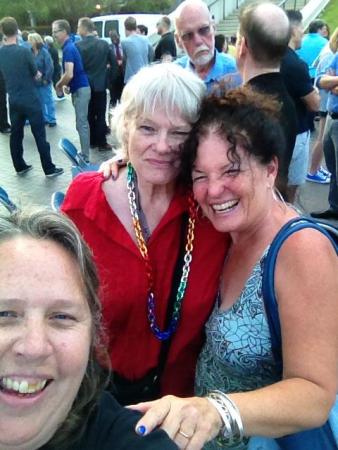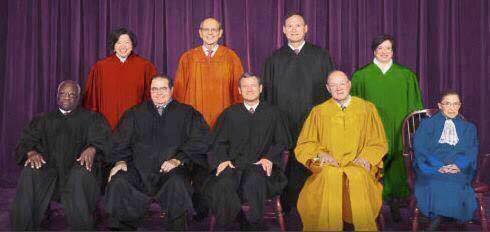
This essay is perhaps the last in an occasional series I have written since the New Year, which can be read here and here. Gay marriage as of June 26th is now legal in the United States. What has changed—and what has not?
If public opinion drives public policy, then the motivation for banning same-sex marriage was moral disapproval, religious disapproval—and the belief that God was not “on the side” of the homosexuals and had cast homosexuals as sinners in the faith choice of the person formulating the public policy critique. Public discourse —based on religious formulations such as “sinner” and what “God intended” had been the primary agents erected into state law to ban the LGBTIQ population from civil rights—such as marriage.
Religious sentiment, such as “you are a sinner” should not make the case for legal judgment. In fact, it was unconstitutional.
Love the Sinner. Hate the Sin.
The Fourteenth Amendment 14, Section 1, states:
No State shall make or enforce any law which shall abridge the privileges or immunities of citizens of the United States; nor shall any State deprive any person of life, liberty, or property, without due process of law; nor deny to any person within its jurisdiction the equal protection of the laws.
In Gitlow v. New York (1925), the US Supreme Court established the “incorporation doctrine.” The effect of that doctrine was that, over time, most of the Bill of Rights in the US Constitution were “incorporated” through the Fourteenth Amendment to become binding on the states. Thereafter, foundational civil rights embodied in the phrase “life, liberty, and the pursuit of happiness,” and in the Bill of Rights, including the right to free exercise of religion, the right to equal protection of the laws, and the right to be free of state establishments of religion, were recognized as superior to state laws deemed to violate those rights.
It was because of the incorporation doctrine that the US Supreme Court was able to reason in Loving v. Virginia (1967) that the freedom to marry was “essential to the orderly pursuit of happiness” and “one of the basic civil rights of man,” and therefore that the laws of sixteen states that banned interracial marriage were unconstitutional under the Fourteenth Amendment. Yet only four years later in Baker v. Nelson (1972) the Court denied the same right to same-sex couples. Why? There was a prevailing metanarrative that cast homosexuals as sinners who were deviant and mentally ill. This metanarrative continued throughout the fight for gay marriage and we see it continuing even today with the legalization of gay marriage.
What we have seen and continue to see is that the religious argument morphs into a discussion about how “religious liberty” will be protected as homosexuals demand civil rights in the public square. We also see an attempt to allow primacy to religious conviction over legal structure. As of this writing there are several states refusing to implement the Supreme Court mandate. In Ohio, a week after the 2015 decision, a judge refused to marry a same-sex couple based on his “personal and Christian beliefs.” While other judges will step up to perform their duties per the Supreme Court’s mandate, what is significant is that the refusal to perform these duties has not resulted in dismissal.
Religious objection to gay marriage has been cited as the refusal to perform marriages also in Kentucky, Texas, Tennessee and Mississippi following the 2015 Supreme Court decision. One Kentuckian circuit clerk cited stated her refusal to sign the marriage license of a same sex couple was because she chose to “obey God and not man.” While a Kentucky judge was quoted as saying that he will step down before he performs a gay marriage, he also noted that no same-sex couple had stepped up to be married in his court.
Churches across the United States have reacted to the new ruling in similar ways. Will religious conviction trump Supreme Court mandate—whether through public dissension, or in the case above in Kentucky, through private intimidation? The history of the difficulty of gay marriage in a progressive state such as California with the Prop 8 fight, and its funding by major religious organizations like the Catholic Knights of Columbus and the Mormon Church, is instructive as to the difficulty LGBT people may have in conservative states.
The legal definition of “animus” implies a law that intends to interfere with the exercise of a right. It has no public interest. Animus is motivated and propelled by disapproval and can also be, by religious conviction, so vehement that the law’s forward motion causes significant damage to those at which it is directed. Gay marriage exists within this historical period where “animus” will no longer be able to be applied to homosexuals, as homosexuals will have the same right to exercise their civil rights, such as marriage, as do heterosexuals. The animus fueled by anti-religious conviction and then funneled into public policy, such as in the case of the LGBT community, has caused egregious harm. It remains to be seen how much of this harm will be repaired and how quickly the letter of the law, which intends to remove this harm, will be applied.
While marriage is about civil rights, the arguments surrounding gay marriage were and are very much about religion. As we come to understand that gay people exist, in and of themselves, separate from a definition of sin that is a theological construct that belongs to others, then we will release judges and lawmakers from “ministerial duties” to define marriage according to “traditional” dictates and view gay people as human beings with unalienable rights, among those the pursuit of happiness.
Many people will say that their wedding day was “the happiest day” of their lives. “I now declare you spouses for life,” was the creative way that most activist marriage officials changed the language to be open to family units other  than “man and wife.” As we move into a culture of “spouses” and away from a culture of “man and wife,” if we are to activate any belief, it is hopefully on the side of “believing” in our Constitution and the underlying right to the pursuit of happiness—even unto the pursuit of that hopefully no longer mythical “happiest day” of their lives.
than “man and wife.” As we move into a culture of “spouses” and away from a culture of “man and wife,” if we are to activate any belief, it is hopefully on the side of “believing” in our Constitution and the underlying right to the pursuit of happiness—even unto the pursuit of that hopefully no longer mythical “happiest day” of their lives.
No union is more profound than marriage, for it embodies the highest ideals of love, fidelity, devotion, sacrifice, and family. … It would misunderstand these men and women to say they disrespect the idea of marriage. Their plea is that they do respect it, respect it so deeply that they seek to find its fulfillment for themselves. Their hope is not to be condemned to live in loneliness, excluded from one of civilization’s oldest institutions. They ask for equal dignity in the eyes of the law. The Constitution grants them that right.
– Obergefell vs. Hodges, June 26, 2015
Marie Cartier is a teacher, poet, writer, healer, artist, and scholar. She holds a BA in Communications from the University of New Hampshire; an MA in English/Poetry from Colorado State University; an MFA in Theatre Arts (Playwriting) from UCLA; an MFA in Film and TV (Screenwriting) from UCLA; an MFA in Visual Art (Painting/Sculpture) from Claremont Graduate University; and a Ph.D. in Religion with an emphasis on Women and Religion from Claremont Graduate University,


So happy about the decision and for your relief and happiness!! I too have rejoiced with every positive decision in the gay marriage debate. Sometimes, it seems that this is the only good thing happening in American public life.
At the same time, the emphasis of the final quote that marriage is the only way to be happy and “not to be condemned to live in loneliness” is profoundly hurtful to those of us who have not found “spouses for life.”
LikeLike
I support gay marriage as the law of the land, but I don’t think we have to marry to be happy. In my opinion relationships don’t require a legal bond to make them fulfilling, and so we don’t necessarily need to find “spouses for life.” I do agree that a great friendship is a great blessing.
LikeLike
The supreme court photo made me laugh. How about if there were no women on the court, there would be no rainbow, no gay rights I would guess.
LikeLike
I phoned a gay couple whom I love and told them if they decide to get married I want to be their flower girl. We’ve had this running joke going for a couple of years.
LikeLike
Reblogged this on Adventures and Musings of an Arch Druidess.
LikeLike
What a wonderful post Marie!
LikeLike